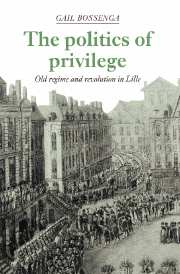Book contents
- Frontmatter
- Contents
- List of figure and tables
- Preface
- List of abbreviations
- 1 Monarchy, privilege and revolution: the problem and setting
- 2 State finance and local privileges
- 3 Corps, bureaucracy and citizenship: the case of the Bureaux des Finances
- 4 The excluded nobility and political representation
- 5 A nation of equals: the demands of the Third Estate
- 6 Uses of a regulated economy: the state against itself
- 7 Corporate privilege and the bourgeoisie
- 8 The abolition of the guilds
- 9 The corporate heritage and the well-ordered state
- 10 Conclusion
- Notes
- Bibliography
- Index
7 - Corporate privilege and the bourgeoisie
Published online by Cambridge University Press: 01 October 2009
- Frontmatter
- Contents
- List of figure and tables
- Preface
- List of abbreviations
- 1 Monarchy, privilege and revolution: the problem and setting
- 2 State finance and local privileges
- 3 Corps, bureaucracy and citizenship: the case of the Bureaux des Finances
- 4 The excluded nobility and political representation
- 5 A nation of equals: the demands of the Third Estate
- 6 Uses of a regulated economy: the state against itself
- 7 Corporate privilege and the bourgeoisie
- 8 The abolition of the guilds
- 9 The corporate heritage and the well-ordered state
- 10 Conclusion
- Notes
- Bibliography
- Index
Summary
In 1789 Lille's revolutionary bourgeoisie called for the preservation of the guilds. By traditional historiographical accounts, this position seems hard to explain. Guilds were reputedly anticapitalist institutions whose regulations retarded the twin processes of capital accumulation and proletarianization. Oriented toward artisanal production, collective interests, and tradition, these bodies encouraged economic statis and stifled technological development. Businessmen, by contrast, were “sturdy individualists.” In perpetual search for inexpensive labor and innovative techniques, these capitalists bitterly opposed corporate regulations that limited productive output, impeded the development of new industries, and hindered competition so necessary to the working of a free market.
Two reasons may be suggested for the rather surprising bourgeois defense of guilds. First, guilds and associated regulations may not have been as artisanal, retrograde, and anticapitalist as commonly thought. Second, the bourgeoisie may have been less enamored of free markets and more ready to enhance their economic power through legal monopolies than typically assumed. This chapter will explore both possibilities by looking at the relationship of merchants and manufacturers to several guilds regulating textile production and trade. Included in the study are the guilds of wool weavers (sayetteurs); the mixed-fabric weavers (bourgeteurs), who worked with linen and silk, as well as wool; the linen thread merchant-manufacturers (filetiers); and the dry-goods merchants (merciers-grossiers).
These guilds are illuminating for several reasons. First, they regulated the production and local trade of two of Lille's most important industries. For centuries the wool industry had been central to the city's economy, but during the eighteenth century, the manufacture and sale of linen thread experienced unprecedented growth.
- Type
- Chapter
- Information
- The Politics of PrivilegeOld Regime and Revolution in Lille, pp. 131 - 167Publisher: Cambridge University PressPrint publication year: 1991



